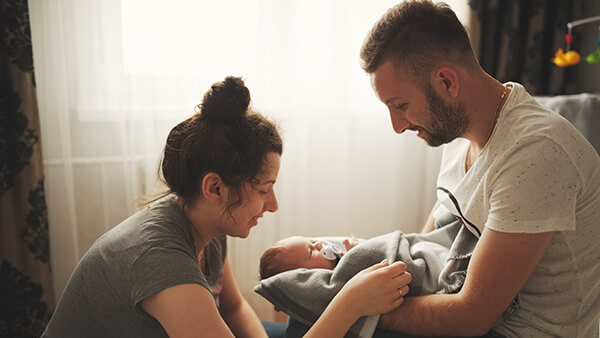Life at home with your new baby
How can this little creature, who barely moves, take up so much time and space?
Read time: 3 m
Verified by Elin Melander
Lic. Psychologist & Couples Therapist
Coming home from the hospital with a newborn can feel pretty strange. Suddenly, there’s a new little person in your home who requires your constant attention, even though they sleep most of the time. It may take some time before you settle into a functioning routine. When are you supposed to breastfeed, change diapers, or get some sleep yourself? And how do you find time to cook? A great tip is to order takeout or ready-made meals for the first few weeks if you haven’t already stocked your freezer. If family members want to visit, tell them to bring food or cook while they’re there—it’s incredibly helpful!
There are plenty of books, magazines, articles, blogs, and other resources about the early days with a newborn and child development. It can be a good idea to read up, as many feel that “knowledge” provides reassurance, and it’s fun and inspiring to learn about your baby and explore parenthood. But remember that all children are different; just because it says so in a book doesn’t mean it will be true for you. Be patient and give yourself time to adjust to all the newness. Find what works for your family. If you’re breastfeeding and have a partner, make sure you agree that they’ll handle the household chores in the beginning—breastfeeding can take up to ten hours a day at first. If you’re alone with the baby, ask for help wherever you can get it—from friends or family. You’ll need some support to rest and recover so you can manage sleepless nights and irregular feeding schedules.
Often, people will want to visit when you come home with the baby. Your mother-in-law has been waiting a decade for this grandchild, and grandpa is ready to teach the little one everything he knows. It’s wonderful to have visitors, but it’s also important to see how much you can handle right now. Sometimes it’s nice to be in your “baby bubble” without distractions: just you, your partner, and any siblings. Don’t hesitate to let your friends and family know that you need some time alone to adjust to your new life. And the family doesn’t need to worry; once you’ve settled into your new routine, there will be plenty of opportunities for babysitting and socializing!
If you’re concerned that your baby isn’t getting enough breast milk, or if you can’t or don’t want to breastfeed, it’s important to seek support and information about your options. You can reach out to the pediatric clinic, maternity ward, or a lactation consultant at the hospital. If you have questions about anything else, don’t hesitate to call and ask.
Verified by Elin Melander
Lic. Psychologist & Couples Therapist
More from Preggers
Hundreds of related articles, podcasts & more waiting for you in the Preggers app.
Download Preggers today.

